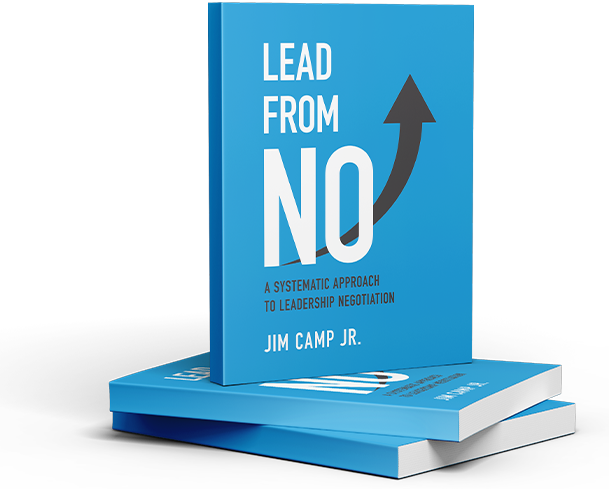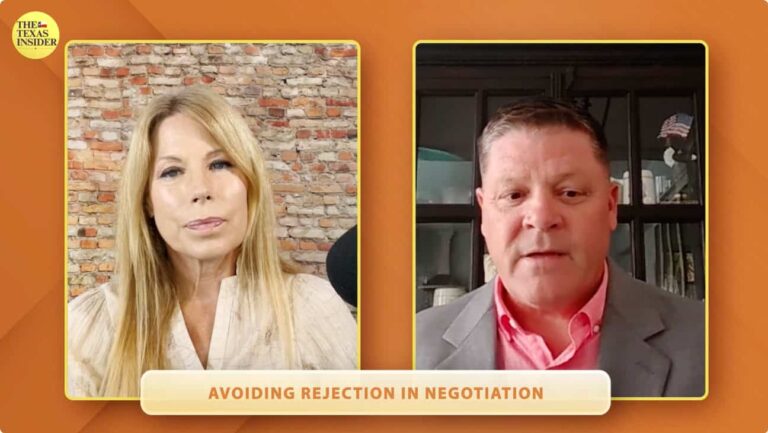By Dave DeSantis
If you are up against a win-win negotiator, they know how to use that approach to victimize you. They can sniff out your “neediness” as you enter the room, like a dog that smells the bacon before you put it in the pan.
Everyone wants to sniff out someone else’s neediness, but it’s critical for you to discover your own neediness and stop it.
Why? You’ll lose more from your own neediness than anything else.
When we tell our coaching clients, “You’re needy,” the truth sometimes stings.
But the fact is, our needs motivate everything that we do. We feel a degree of neediness when we are anxious. We also feel it when we are unable to control something essential to us.
When people are needy, they lose their focus, and emotions go awry. This behavior leads to bad decisions.
Where does neediness come from?
We are born needy. As babies, our parents provided all our essentials.
This was fine for a few years, but after we started talking, one of our first words was, “No!” Little by little, every child becomes more independent and doesn’t want to be told what to do.
Children also learn that “No” often produces an adverse reaction from their parents. When a child rejects eating the carrots, a parent gives the child a disapproving look. The child knows that is not good. Now the child has learned that “No” is a double-edged sword.
• “No” gives us control over our life.
• “No” challenges the relationships with people in our lives that we rely on.
Early on, we learn that the word “No” makes us leery of disappointing people or losing a relationship with someone we need. This memory survives into adulthood.
That’s why, as adults, no one wants to hear “No” in a negotiation. Let’s say that you make an offer, and your opponent responds with a firm “No.” In your mind, you may exaggerate the significance of the word no. Your insecurities rise because you’ve lost control.
This is when we have to gain perspective. When your respected opponent says, “No,” does that mean they’ll toss you out of the room? Probably not. After all, they wouldn’t have met with you if they didn’t need anything from you.
Yet the impact of your opponent’s rejection lingers, and you don’t like it. You feel like you’re losing control. Sometimes it becomes an obsession, and you need to fix it before you follow a predictable path.
The predictable path of the needy
If you feel out of control and needy, you signal (to your respected opponent) that you are open to bad decisions by:
• Volunteering that your offer is not firm.
• Pulling back and saying, “We can work something out.”
• Reminding them that you value the relationship and don’t want to leave on bad terms.
When you are needy, you are talking yourself into a compromise that is not necessary.
The trained win-win negotiator’s strategy
If you are up against a win-win negotiator, what will they do to you? They will:
• Wager that you are not a trained negotiator or make you prove that you are.
• Assume you’ll follow your instinct to save the relationship, instead of solidly presenting what you want.
• Test how quickly you compromise when you hear the word “No.”
• Probe you for weakness. They will then offer to save you from your weakness by promising you more business in the future. Of course, this requires a better deal today.
• Infer that your entire value as a person is related to the price you charge for your goods or services.
• Compare you to the lowest-priced supplier and claim that the competitor wants the business more than you do.
This is how the win-win mindset is used against you. Your respected opponents use it to drive your neediness. Notice that they are not creating your neediness; they are unearthing what is already there.
Maybe they quickly sniffed you out, and they know you want to “look good and be a team player,” to their management. Or it would be best if you met a quota. Or you kept a long-term relationship. The opponents often know you will not challenge them when they say that the selling price is more important than your superior performance.
After you are exposed, your opponent pounces, and they look for even more by using win-win negotiation against you. They ask for concessions and promise to help you with your weakness if you deliver on their request.
What do we really need?
Let’s look at the four needs we have.
#1 – Physical need for personal safety: air to breathe, water, food, sleep, clothing, shelter, and sex.
#2 – Security: from future harm or loss, mitigating threats to our safety or status.
#3 – Social acceptance: our need for love, acceptance, affiliation, and friendship. We want to be part of a group and collaborate with others.
#4 – Aspirational: our need for respect from others and the autonomy to make our lives better. It includes our desire to learn and improve. In overdrive, it makes us want to be better than other people.
We must differentiate what we “need at the moment” from our “wants.”
Example 1 – A need
You are a scuba diving guide, and you are fifty feet underwater with a novice partner. While you are in a cave, the breathing line to your air tank fails. You have about 60 seconds to get access to your partner’s air tank. If you don’t, you will pass out from a lack of oxygen.
Your urgency is exceptionally high, and you must negotiate and make decisions to share an air tank with another person. That is a critical negotiation for your life. You will pay or trade everything to get access.
Although you need the air, you can’t control whether the other person will let you access their air tank. You can only control your decisions and actions to influence the person to share their tank.
The worst thing to say would be, “Give me your tank now.”
Why? According to the Camp System, you have to get into the other person’s world. People respond to what is important to them.
Instead of demanding the tank, communicate the problem and how you can help the person with the tank.
You say, “I know the fastest way out of the cave, but my air tank failed. I can get both of us to safety if you would share your tank.” (That took eight seconds, you still have 52 left.)
You can remain calm because you are using a negotiation system. Communicate with the other person to help them get out of this dangerous situation, with little risk to everyone.
From your respected opponent’s point of view, they “win” because you helped them “see” that their exit from the cave is questionable without your help as a guide. The air you require is a small or no price for them when they learn that they are in danger because of your air tank failure.
Example 2 – Not a need
You are negotiating the selling price of your company’s product with your respected opponent. Your “need” is really a “want.” Getting a sale is not as critical as gaining access to the air tank. Any perceived urgency is not real; this is not a life or death decision.
The sale doesn’t have to happen today. It could happen tomorrow or next week.
Effective Negotiation
To negotiate effectively, first get alignment on what you will provide to your respected opponent and how you will deliver it. (In our example – a safe exit from the underwater cave.)
Then, you make sure that the product, service, or solution you’ll deliver to them addresses their real problem. (Your knowledge of a safe exit route from the cave.)
Next, let your opponent confirm that your solution will help them.
Only now will you determine if you want to help them by offering your solution – under terms that make sense to you. (Your terms are, “For access to your air tank, I will provide you a safe exit by guiding you out of the cave.”)
When you are negotiating something that you don’t need, take the time to discover what the other side needs. Then you build vision if the solution solves their pain.
Remember, 99% of the time, you aren’t in the “air tank” situation: you have more than sixty seconds here. Don’t feel you need to compromise before you and your respected opponent agree on all the problems that will be addressed.
Avoid attachment to outcomes that are not in your control
When your physical existence or safety is threatened, then your need is high. For all other negotiations, including social and aspirational types, you don’t need the outcome. You only want it.
In a negotiation, we think that our financial security or relationships are the root of our neediness.
We believe that if we don’t get the deal, we won’t meet our sales quota. Then we’ll lose our jobs. We may have to sell our house. Then we won’t get another job. We imagine an unlikely domino effect, and we have no control over those events either.
The truth is that our need for financial security is related to our fear of losing what we already have, rather than the anxiety of not getting more.
Maybe we are afraid that our respected opponent will no longer be our friend, or the relationship will suffer if you don’t give them what they want. The spoiler alert is – if they value your selling price more than your friendship, they’re not your friend.
There is great danger in internalizing the need for anything other than your physical safety or immediate security. There is also danger in showing fear. The risk is that you will appear needy to others who are not your friends. Jim Camp refers to these people as predators.
So when you were showing real or imagined fear, what does a predator do? The predator attacks because the prey is distracted and weak. So be clear on what you need, like “air” versus what you want, like a “sale.”
When you buy something like a new car, if your neediness is apparent to your opponent, you will be taken advantage of by any good negotiator. This is how a predator will attack the weak and unprepared.
How to prevent neediness in the negotiation process
1. Come into the negotiation with no expectations that you will win or get what you want because the truth is: you really don’t know.
2. Eliminate your fear of rejection, also known as losing the relationship or friendship.
3. Never view yourself as being in a weaker position than your respected opponent. Remember, they agreed to see or speak with you. They would only talk to you if they needed something or were interested.
4. Less talking. When you’re talking, you’re losing because you are not learning. When you are listening, you learn the information you need to make decisions.
Can I help my respected opponent? Do I want to help them under conditions that make sense to me?
5. No closing. Don’t focus on closing a deal. If it is going to happen, it will because you’ve built the vision with your respected opponent that you can solve their pain. You only do this under conditions that are acceptable to you.
If you didn’t do that, there is no close to the negotiation.
6. If you don’t want to show neediness, train yourself to not “feel” the need. Develop a habit to replace the word “need” with “want.”
To learn more about Camp Coaching, click here.





